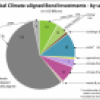The Importance Of Being Energy
To broaden appeal, companies may stretch their wings across both sides of the environmental divide by joining multiple industry trade groups. In some cases, standing with a foot in opposing camps can complicate a company’s communications strategy, especially when it comes to heated issues. The cleantech sector finds itself at such a juncture in 2009 as it struggles to enlist allies in creating a clean energy economy—something that the unlikely alliance of climate scientists, government agencies, military analysts, environmentalists and forward-thinking business leaders are starting to reckon with.
The green leaning blogs have adopted the metaphor of companies abandoning the ACCCE sinking ship. But it feels more like watching a motley flock of birds who have lost their way. What follows is a brief account of how companies are eyeing the climate policy divide.

Ears pricked up while climate goals were crafted into the legislative language and companies tried to gauge what risk this might bring to their business requirements. By June 26 when the Waxman-Markey bill passed the House, it had literally ballooned from approximately 1,200 words to the 1,600-word American Clean Energy and Security Act. That’s a lot of new limits, reporting deadlines and bottom-line implications to grasp.
Two major associations sprang up over the last three years trying to do just that, embolden industry to contain such strictures. The American Coalition for Clean Coal Electricity (ACCCE) leads the no-hurry fossil fuel flock. While the U.S. Climate Action Partnership (USCAP) is made up of businesses and organizations supporting various permutations of climate legislation. Torn between the two, a few firms dove into the rising waters from each end of the policy pool by joining both groups. Not surprisingly, the illogic of backing coal and supporting climate protection quickly sent some popping to the surface gasping for air.
Take the case of Duke Energy, the third-largest electric utility in the U.S., which is a founding member of USCAP and was a member of ACCCE. Other dual members were General Electric, Caterpillar and Alstom. (See Brendan Demelle’s September 2 blog for a list of overlapping memberships at the time). Duke first edged closer to the green line when it left the National Association of Manufacturers (NAM) for differences over climate policy, as The Atlantic blogger Mark Ambinder wrote in May.
Initially, the ACCCE mission seemed aligned with Duke’s support for new technology to reduce greenhouse gas emissions. But when details of the proposed legislation came to light, as Amy Harder explained in theNational Journal, ACCCE became disenchanted with cost-containment mechanisms and regulatory jurisdiction over carbon storage.
The perplexity that comes with joining ACCCE, is that the American Petroleum Institute (ACI) is a key member and contributor. Furthermore, ACI is backed by such heavyweight contributors as ConocoPhillips, Siemens and BP America, which so far have denied the necessity to rush into a climate protection agenda.
Contrary to its intent to dissuade votes for the bill, the American Petroleum Institute (API) ruffled feathers when it was learned that ACCCE-hired public relations firm Bonner & Associates had sent falsified letters asking members of Congress to organize and derail the climate bill. Despite the fact that Duke Energy uses coal to produce about 70% of its electricity, early in September after it became clear that the American Coalition for Clean Coal Electricity would not any time soon be ready to support climate legislation, Duke terminated its membership.
The ACCCE also lost backing from French power plant components manufacturer, Alstom. In Washington, National Resource Defense Council’s Climate Watch Director Pete Altman, noted in the Switchboard blog that two other companies, Alcoa and First Energy, were removed from the ACCCE members page earlier this year, although neither publicly stated their reasons.
Another example of how a company walks the green talk comes from Caterpillar, one of the world's largest producers of diesel and natural gas engines. It holds not only a dual membership in ACCCE and NAM, both on the brown side, but also joined the pro-legislation side. In a statement to the National Journal, Caterpillar explained the benefit it sees in joining USCAP: "We are confident that through our participation in USCAP, our messages -- representing key customer interests -- like clean-coal technologies -- have resonated with many."
Of course, there are those Greens who would paint today’s existing clean coal technologies brown and no doubt hold them up as further reason to approve climate protection law even more quickly.




